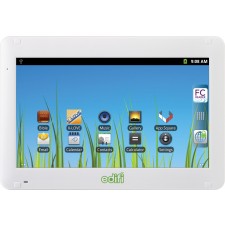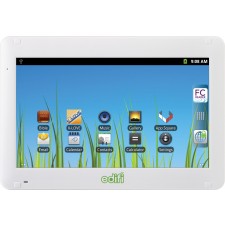Last week news spread about the release of Family Christian’s edifi, which is being billed as the world’s first Christian multimedia tablet.
Okay, I know what you’re thinking. At least I know what you should be thinking. What exactly makes a multimedia tablet "Christian?" There are a number of denomination-specific punch lines that come to mind, but I’ll leave those to your imagination. And, in fairness, I should note that I have not been able to find the notion of a “Christian tablet” linked back directly to the company or its representatives.
 That said, it is certainly clear that the edifi tablet is being marketed as a tablet specifically designed for Christians. According to the technology supervisor at Family Christian with the Bunyan-esque name, Brian Honorable, “It goes along with our mission: trying to get people closer to God … through a tablet.” Mr. Honorable also added, “We definitely had to tailor it to our customers.” Presumably, Christians.
That said, it is certainly clear that the edifi tablet is being marketed as a tablet specifically designed for Christians. According to the technology supervisor at Family Christian with the Bunyan-esque name, Brian Honorable, “It goes along with our mission: trying to get people closer to God … through a tablet.” Mr. Honorable also added, “We definitely had to tailor it to our customers.” Presumably, Christians.
So perhaps the question should then be, what makes a multimedia tablet Christian-friendly? To answer this question, we should see if any of the tablet’s features distinguish the edifi from its, dare I say, secular competitors.
Examining the technical specifications won’t get us very far. The tablet is a rebranded Cydle Multipad M7 manufactured by a South Korean company without the benefit of any divinely inspired design documents (so far as we know). If we look to the tablet’s software we get marginally closer. Family Christian’s website identifies four “family-friendly” features: the pre-loaded Family Christian Reader app (with five free Christian titles included), Safe Search Wi-Fi web browsing, 27 Bible translations, and Christian internet radio.
Login to read more
Sign in or create a free account to access Subscriber-only content.
Topics:
